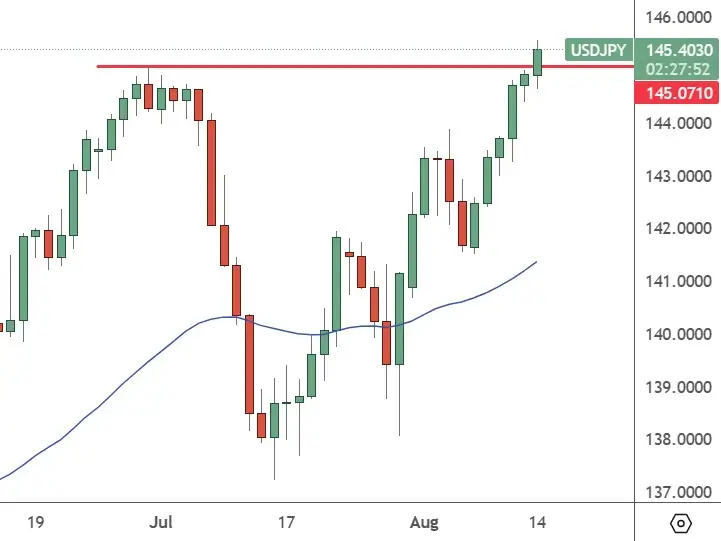The USDJPY exchange rate will have GDP data released from the Japanese economy before Tuesday’s session.
 USDJPY – Daily Chart
USDJPY – Daily Chart
A recent rally in the USDJPY has seen the greenback push above the 145.00 level. A pullback could come if Japan’s economy improves.
Japan’s economy is expected to grow at an annualized 3.1% in April-June for a third straight quarter of expansion, according to a poll of economists by Reuters. The country has seen some resilience in exports despite slowing global demand.
The increase would follow a 2.7% return in the first quarter, with a quarter-on-quarter expansion of around 0.8%.
“The data will show Japan’s economy is recovering moderately with consumption and capital expenditure maintaining momentum,” said Shinichiro Kobayashi, an economist at Mitsubishi UFJ Research. Capital expenditure is expected to have grown 0.4%, with private consumption edging up 0.1%, slowing from a 0.5% gain.
“Consumption has been recovering, mainly for services industries as the economy has re-opened. But the recovery may have run its course as rising inflation weighs on real income,” said Ryutaro Kono, an economist at BNP Paribas.
Strategists at Rabobank have downgraded their outlook for the yen against the US Dollar with a three-month view near the current 145. Over the longer term, expectations are for a rally in the yen to 140 in nine months and 135 by the end of 2024. The prediction is based on an easing of the Federal Reserve’s monetary policy.
Analyst Jane Foley suggests that the market’s moves indicate a possibility of the BoJ maintaining its dovish stance.
“The messages contained within the BoJ’s July policy adjustment have not been easy to decipher,” said Foley.
The Bank of Japan was unhappy with the strong dollar in 2022, with interventions at 150, which could limit any upside from the current breakout. The United States economy will release retail sales on Tuesday, 14 August, with an 0.4% improvement from the 0.2% expected.
The yen will be intriguing to watch due to the current fears over Chinese property. The Japanese currency often picks up as a safe haven in times of trouble in Western markets, but how it performs with trouble closer to home remains to be seen.
Chinese blue chips suffered after shares of Country Garden slid more than 12% to all-time lows following the suspension of trading in 11 of the company’s onshore bonds. Also, the state-backed developer Sino-Ocean missed US $20 million in interest payments. The financial troubles added to fears that a hoped-for recovery in the country’s property sector may not emerge as a growth driver.
“The suspension of onshore bonds by Country Garden implies a potential restructuring,” said Raymond Cheng, managing director of CGS-CIMB Securities. “Probably they suspended trading in case any sensitive or inside information might be disclosed, which would add to market speculation and thus impact on any restructuring.”


